Judge Denies Trump’s Demand to Move Hush-Money Case to Federal Court, Is Unmoved By Claims That Trial Judge Is ‘a Certified Trump Hater’
‘Good cause has not been shown’ to move the case out of Judge Juan Merchan’s courtroom.

A federal judge rejected President Trump’s request to move the felony hush-money case, brought against him by Manhattan district attorney Alvin Bragg, from state to federal court on Tuesday. The decision when and if Trump will face sentencing for his criminal conviction now lies in the hands of the presiding trial judge in the case, Juan Merchan.
“Good cause has not been shown, and leave to remove the case is not granted,” U.S. District Judge Alvin Hellerstein of the Southern District of New York ruled in his order made public on Tuesday.
“Since the defendant filed his notice after he was tried, he must show ‘good cause,’” Judge Hellerstein wrote. “As to ‘good case,’ he advances two grounds. First he asserts that the New York courts were biased against him, resulting in an improper trial … Second, Trump argues that Trump v. The United States,” here the judge referred to the Supreme Court’s recent landmark decision on presidential immunity, “grants him immunity from prosecution,” the judge explained before he laid out his reasoning.
Trump’s legal team filed the request to move the criminal case from state to federal court last Friday, as the Sun reported, in a last-minute attempt to prevent Trump from being sentenced for his felony convictions by a judge the 45th president has called “a certified Trump hater.”

In May, a Manhattan jury found Trump guilty on 34 counts of falsification of business records in an alleged scheme to interfere with the 2016 election, making Trump the first former president in the history of America with a felony conviction. At the heart of the case was a $130,000 hush-money payment that Trump’s then personal attorney, Michael Cohen, made to the pornographic performer, writer and director Stormy Daniels, whose real name is Stephanie Clifford, in 2016 to buy her silence about her claim that she had a single sexual encounter with Trump at a celebrity golf tournament at Lake Tahoe in 2006. The prosecution accused Trump of directing Cohen to wire the money to Ms. Clifford and then disguising his reimbursement to Cohen as a legal fee. Trump denies all charges and says he never had sex with Ms. Clifford.
“I didn’t have sex with a porn star,” he said at his June 27 debate with President Biden.
Before the case went to trial last spring, Trump made the same request to the same federal judge, asking to move the case to federal court. Oral arguments were held before Judge Hellerstein in July during an evidentiary hearing. The judge rejected the bid then, and wrote on Tuesday that he found no “good cause” to change his decision.
The historic Supreme Court ruling, which Trump raised as one of his good cause arguments, held that “a former president is entitled to absolute immunity from criminal prosecution for actions taken in the exercise of his core constitutional powers,” Judge Hellerstein clarified, meaning a former president cannot be held accountable for actions he took in service of the presidency. The decision further restricts prosecutors from using official acts as trial evidence. But, as Judge Hellerstein noted, the ruling grants “no immunity to unofficial acts. Criminal courts trying the former president are required to evaluate his actions to distinguish official from unofficial conduct.”

“I held in my Order and Opinion of July 19, 2023 that ‘hush money paid to an adult film star is not related to a President’s official acts. It does not reflect in any way the color of the presidential duties,” Judge Hellerstein wrote. “Nothing in the Supreme Court’s opinion affects my previous conclusion that the hush money payments were private, unofficial acts, outside the bounds of executive authority.” He added that, “private schemes with private actors unconnected to any statutory or constitutional authority or function of the executive, are considered unofficial acts.”
Regarding Trump’s concern that Judge Merchan, whom Trump has called “highly conflicted”, is biased against Trump, Hellerstein wrote that his court did not have the “jurisdiction to hear Trump’s arguments concerning the propriety of the New York trial.”
Trump’s defense team argued that Judge Merchan has a conflict of interest because his adult daughter, Loren Merchan, is a partner at the left-leaning digital agency Authentic, and has done campaign work for some of Trump’s most devoted adversaries, including Representative Adam Schiff, who’s favored to win Dianne Feinstein’s Senate seat in November, and Vice President Harris, who is now running against him in the upcoming presidential election.
After Trump denounced Ms. Merchan, her father gagged him from criticizing her or other family members of courtroom personnel, citing like other judges who have imposed gag orders against Trump, an increase in death threats from Trump supporters. When Trump did not adhere to the order and continued to make public remarks, the judge threatened to jail the former president should he violate the order again. Trump’s legal team sought three times to get Judge Merchan to recuse himself, arguing most recently that the ascension of Ms. Harris to the top of the Democratic 2024 ticket made his conflicts of interests all consuming.

Judge Merchan has refused to remove himself from the case, asserting that he had consulted with New York’s Advisory Committee on Judicial Ethics, which found that his daughter’s work did not impact his impartiality and ability to rule. The committee opined that “a judge’s relatives remain free to engage in their own bona fide independent political activities” and that “the matter currently before the judge does not involve either the judge’s relative or the relative’s business, whether directly or indirectly.”
Judge Hellerstein wrote that his court has no jurisdiction to rule on these matters. “District Courts may not reverse or modify state judgments, even those containing constitutional infirmities because ‘to do so would be an exercise of appellate jurisdiction,’” he wrote, adding that the appropriate legal step would be to appeal the conviction through state court. Trump has said he will appeal, but can only do so after he is sentenced.
Independently, Manhattan prosecutors wrote a letter to Judge Merchan on Tuesday informing him of Trump’s attempt to move his case to federal court, and asking him to keep the case in his court and to rule on the two pending motions.
Trump has asked Judge Merchan to dismiss the verdict and the entire indictment against him in the wake of the Supreme Court immunity decision, arguing that much of the evidence used at trial was related to “official acts.” The alleged reimbursements for the hush-money payment to Cohen, Trump’s former lawyer, occurred in 2017, when Trump was president. The defense argued that numerous tweets the prosecution cited as evidence during trial, and phone calls Trump made, were all from the time, when he resided in the White House. Especially inappropriate, the defense found, was the testimony of two of Trump’s close aides, his former communications director Hope Hicks, who wept on the witness stand, and his former Oval Office assistant, Madeleine Westerhout, who remained loyal to her former boss, even after she was fired for making unflattering comments about Tiffany Trump.

Judge Merchan said he would rule on the motion on September 16. The other motion awaiting his ruling is Trump’s request to move the sentencing date, which is now scheduled for September 18, until after the election.
Prosecutors wrote in their letter on Tuesday, as they had previously expressed, that they would leave the decision whether to move the sentencing date up to the judge, writing that “we defer to the court on the appropriate post-trial schedule,” which would allow Trump “adequate time” to appeal his verdict, but “without unreasonable delay.”
However, the district attorney’s office added that “the concerns” Trump raises “about timing are a function of his own strategic and dilatory litigation tactics: This second notice of removal comes nearly ten months after defendant voluntarily abandoned his appeal from his first, unsuccessful effort to remove this case; three months after he was found guilty by a jury on thirty-four felony counts; and nearly two months after defendant asked this Court to consider his CPL § 330.30 motion for a new trial.”
It is not clear when Judge Merchan will rule on the sentencing date.

